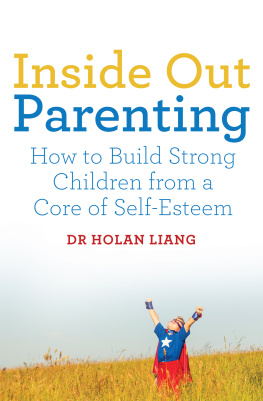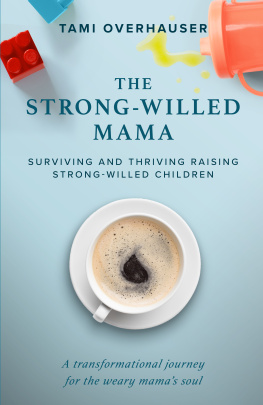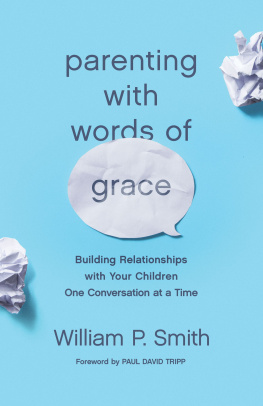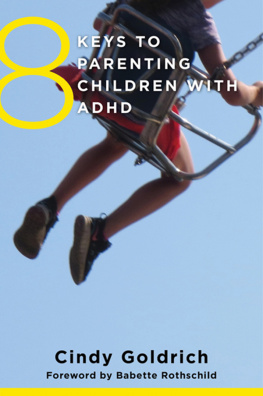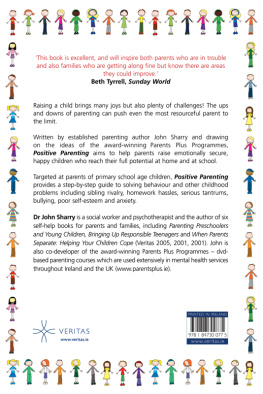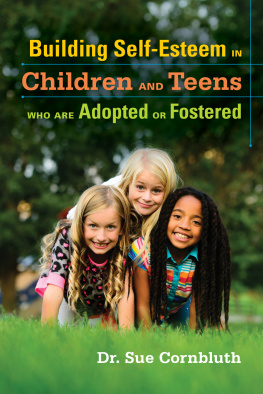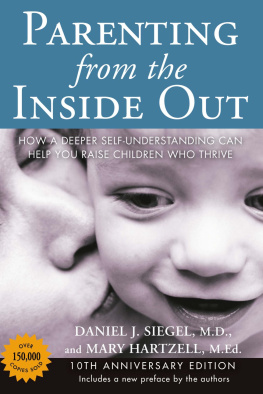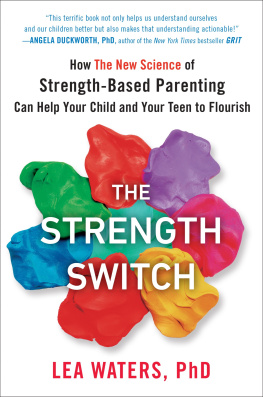For my parents
Contents
Introduction
Oh, for pitys sake! I silently cursed.
I had timed the nursery run to a tee and for once we were actually on schedule until my three-year-old daughter, Molly, realized that her new shoes did not have her name label in them. Disaster! I tried to persuade her that this would be fine for one day and promised to stick the labels in that night; I explained that I couldnt do it there and then because we would be late for her nursery (and, more importantly, I would be late for a meeting I was due to chair). But Molly out and out refused to see reason.
So I tried cajoling, then bribing, then threatening her. All to no avail. Ultimately I gave in, impatiently got the name labels and grumpily stuck them in her shoes. But by then it was too late. Molly was digging her heels in and her anger wasnt just about the shoes anymore, but had become an incoherent fury with the world in general. And she was still refusing to put on her shoes. There followed more shouting, this time from me, along the lines of, Now Im going to be late! Reciprocal shouting and foot stamping from Molly ensued, until I realized that physically picking her up, bundling her under my arm and forcibly depositing her in the car was the only way I was going to get anywhere that day.
This was no mean feat. Picture me shuffling sheepishly down the road to the car, praying not to encounter any of my neighbours, Molly tucked under my arm like a log, kicking and screaming, with no shoes on. Simultaneously, my eighteen-month-old son D (Chinese for little brother, which is what weve always called him), was clinging on to me like an oversized pendant, his arms wrapped tightly around my neck. Assorted nursery-required paraphernalia was haphazardly piled into two bags, which weighed down so heavily on my elbows that they were cutting off the circulation to my fingers, from which dangled the contentious shoes. I must have resembled a demented rag and bone woman with my assorted wares hanging all over me. Meanwhile, Mollys ongoing high-pitched wails of, Youre hurting me! advertised our approach to everyone in the neighbourhood.
It was on that day of model motherhood that I decided I should write a book about parenting. If this seems perverse, I havent even confessed the funniest part of the story yet. About an hour after that little episode, I finally took my seat at the meeting. There I sat, solemnly discussing the effects that compromised parenting has on the mental health of children. Believe me, the irony was not lost on me.
You see, I am a child psychiatrist. Handling Mollys meltdown should have been second nature to me, but it wasnt. After this humiliating escapade, I started to write down the more ridiculous of my parenting moments, because on one level they intrigued me: Surely a child psychiatrist should know better? I kept asking myself.
Before having children I probably considered myself something of a parenting expert. I doled out parenting advice to parents like hot dinners and wore my, I know about parenting; Im a child psychiatrist yknow badge with pride. It was only when I actually became a parent that I woke up to the humbling reality that there is no such thing as a parenting expert. Parenting is, in essence, often a process of mainly well-intentioned trial and error. The well-intentioned part is important because in recent times parents have been taking their role in their childrens development much more seriously. Weve come a long way from the days when children were seen and not heard; when it was fairly common for them to be farmed out to wet nurses, governesses or boarding school at one end of the social spectrum, or sent up a chimney at the other. We now know that leaving the administration of parenting to others means potentially leaving the outcomes of our children, and the adults that they will become, in the hands of others.
Indeed, sometimes it seems we have gone to the other extreme; there has been such a seismic shift in our attitudes towards parenting. Rather than abdicating responsibility for our children, or being ambivalent, we now have an almost obsessive preoccupation with them. I like to think that this is because my profession has done such a great job at promoting the importance of loving and understanding our children, though cynics might argue that it has more to do with the fact that most of us can no longer afford nannies, governesses or boarding schools. Whatever the reasons, there is no doubt that there is now a genuine interest in giving our children the best possible start in life. And, on a purely selfish level, what could be more fulfilling than being surrounded by a happy, tight-knit, loving family?
What Child Psychiatrists Do
Child psychiatrists, who should not be mistaken for child psychologists, are a rare breed with a unique training. Whilst child psychologists study psychology, child psychiatrists start by studying medicine and surgery. Many, including myself, will also study for a degree in psychology and then practise medicine, surgery, adult psychiatry and psychotherapy before specializing in children. All in all, the training takes a minimum of thirteen years, with a fair few exams along the way. And if you really love the subject, as I do, it will take even longer because youll take a detour into research, trying to find answers to questions about child development and mental health, as well as trying to treat them. As this was the route that I took, my interests span not only the thoughts and feelings of children and their behaviour, but also how these are underpinned by genetics and the way our brains work. In other words, I know my neurotransmitters from my hormones and am as comfortable with synapses as I am with psychoanalysis. I guess that you could say I know about children inside and out.
But even expert knowledge can wither in the face of a screaming child in full-on tantrum mode. Every new parent worries about how they will measure up. This insecurity is compounded by the fact that many women of my generation are given more advice on handling boardroom tactics than nursery tantrums. And yes, I can confirm that I was one of these women; I certainly wasnt prepared for my transition from high-flier to bum-wiper. Faced with my own inadequacies, as a scientist I reverted to type. I delved even further into scientific papers and started to attend lectures given by world leaders in child development, all in a bid to help me improve my parenting. As well as having an extensive background in working with children, I have been fortunate enough, through my work, to have had access to some of the most fascinating scientific theories regarding parenting around. This is the information I will be sharing with you in this book. This, and the comforting knowledge that even parents who are doctors and scientists get it wrong sometimes.
As a child psychiatrist, my views are influenced by both psychology and neurology and, needless to say, I know my facts and figures on child mental health. These are stark: 75 per cent of adult mental health problems begin before the age of eighteen years, and 50 per cent begin To me, this is clear evidence that if we want to promote psychological well-being, we need to look at what is happening much earlier than adolescence. If we want happy, healthy, successful adults, we need first to raise happy, healthy children.
There is an interesting new development in psychology research which looks at resilience in children. The technical definition of resilience is a dynamic process by which individuals adapt emerge untarnished, while others are emotionally crippled for life? This umbrella term resilience is likely, in reality, to describe a mixture of factors: self-esteem, adaptability, grit, self-worth, a can-do attitude, strength of character and a whole host of similar qualities for which I dont think the English language, at present, has just the right word. Lets just call the whole enigmatic lot inside stuff for now. I believe that the stuff that really makes a child or an adult who they are comes from these qualities that are hidden on the inside. You wont be able to see them when you first meet a child, but they are critically important to how that child functions and develops.

